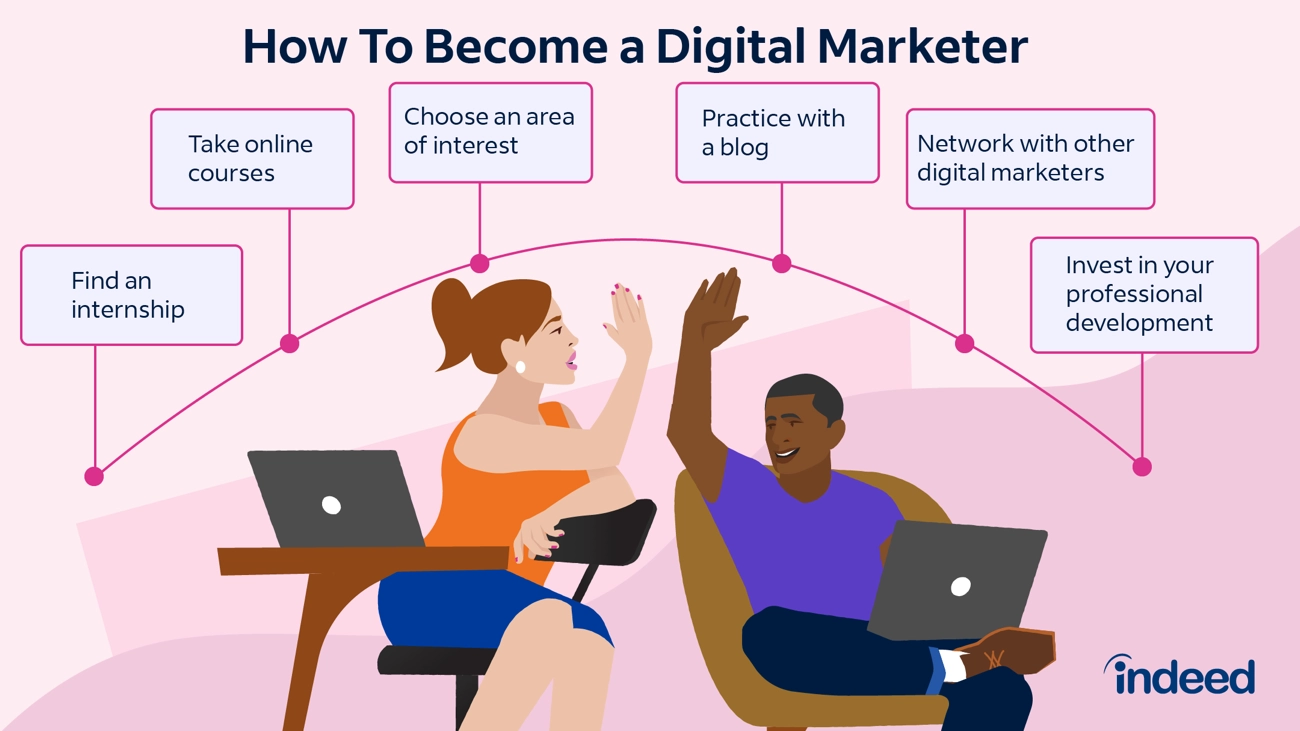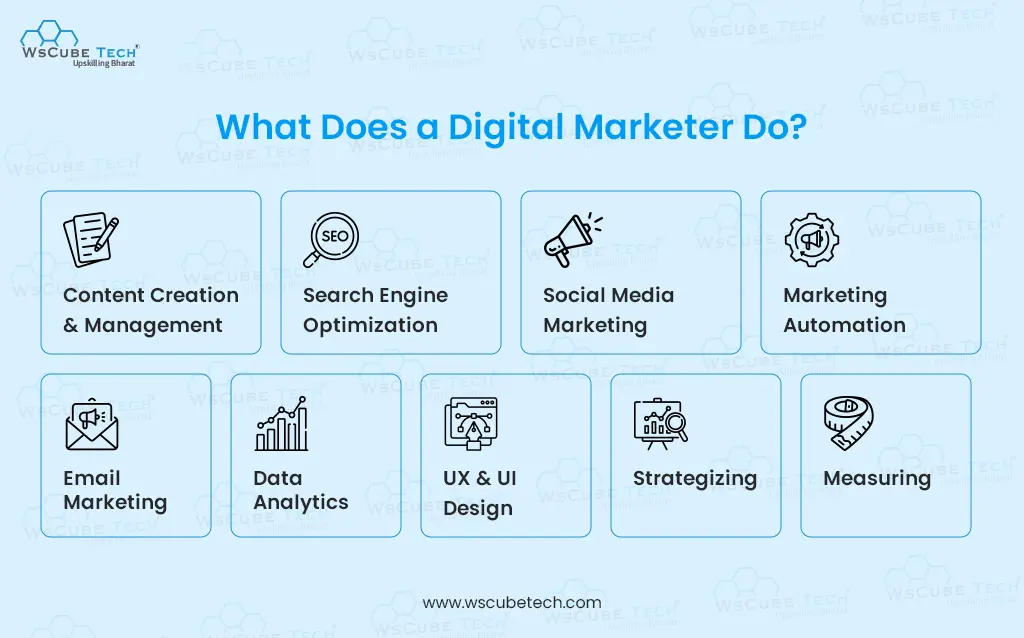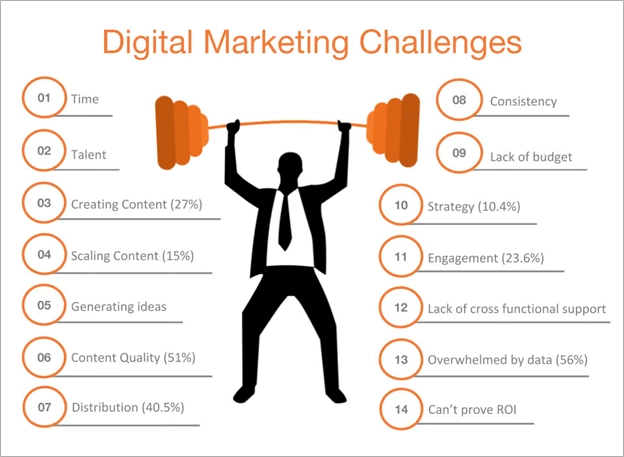Digital marketers use both creative and data-driven tactics to help brands grow online. Their job covers many tasks – like running email campaigns, managing paid ads, improving SEO, and building a presence on social media. They also track website traffic to learn what works and adjust their strategies.
Landing pages are one of their key tools. Whether promoting a product, capturing leads, or supporting a campaign, landing pages help turn clicks into actions.
As digital activity grows, so does the demand for marketers with these skills. This article explains what digital marketers actually do, the tools they use, and how their work helps businesses succeed online.

Who Is a Digital Marketer?
A digital marketer helps businesses grow by using online tools to reach and influence customers. They plan and run campaigns on websites, search engines, social platforms, email, and digital ads. The goal is simple – get attention, hold interest, and drive action.
To do this well, a digital marketer needs both creative ideas and clear thinking. They write, design, test, and adjust their work based on results. They study how people behave online, and they shape their strategies to match user habits and needs. They build campaigns that guide potential buyers from curiosity to conversion.
Digital marketers often focus on one area like search engine optimization, content creation, or paid ads. But they still need to understand how all digital marketing channels work together. This broad view helps them align their efforts with larger business goals.
Turn clicks into customers. Discover how landing pages can power up your digital marketing strategy.
People enter digital marketing from many paths – some come from writing or design, others from data or communications. The field is open to anyone who learns the tools and keeps up with how users change. Curiosity, adaptability, and focus matter more than any one degree.
A skilled digital marketer knows what to say, where to say it, and how to measure the impact. They use tools to track data, test ideas, and refine their approach.
For those aiming to become managers, it’s important to go beyond tactics. Managers need to set direction, lead projects, and connect digital work to business results. They need hands-on experience across platforms and a sharp view of strategy.
Anyone serious about digital marketing must commit to learning. Tools, platforms, and user habits change fast. What worked a year ago may not work today. Keeping your skills sharp is part of the job.

Digital marketing rewards people who can think clearly, act fast, and keep learning. It’s a mix of logic and creativity – and the work you do is easy to measure. If you enjoy solving problems and making things that get results, this could be the right field for you.
What Are The Responsibilities of a Digital Marketer?
A digital marketer is responsible for planning, running, and measuring online campaigns that help businesses grow. Their work begins with setting clear goals and choosing the right channels (like search engines, social media, or email) to reach specific audiences. They study customer habits and build campaigns that match how people browse, search, and buy online.
One core task is content creation. Digital marketers write blog posts, design emails, and post on social media. The content must be useful, clear, and consistent with the brand’s tone and message. They often work closely with writers, designers, and developers to keep everything on-brand and user-friendly.
Managing paid ads is another major duty. A digital marketer sets up and monitors ads on platforms like Google Ads or Facebook. They track how well the ads perform and make changes to improve results. If one ad isn’t getting clicks, they test new versions or shift the budget to better-performing ads.
Your ads move fast—your landing pages should too. Optimize on the fly with total flexibility.
Data analysis plays a constant role in their work. A digital marketer uses tools like Google Analytics to review how users interact with websites and content. They check key metrics such as click-through rates, bounce rates, and conversions. These numbers help them learn what’s working and what needs fixing.
They also run A/B tests to compare different versions of ads, pages, or emails. This helps improve performance step by step. Small changes (like a new headline or button) can lead to better results.
Another responsibility is managing the company’s online reputation. Digital marketers reply to messages, reviews, and comments on social media or through email. This builds trust and shows customers they are heard. Relationship-building is just as important as promotion.
They keep improving their work based on real data, not guesses. The role blends creativity, planning, and problem-solving – and every decision has a clear purpose.
What Does a Digital Marketer Do Daily?
A digital marketer spends each day creating, reviewing, and improving online campaigns to meet business goals. The day often begins by checking campaign data – looking at traffic, conversions, and how users are interacting with content. These insights guide decisions like changing an ad or updating a headline.
Creating content is a regular task. This includes writing blog articles, designing emails, or planning social posts – always aligned with brand goals and messaging. They manage active campaigns by updating targeting, rewriting ad copy, or shifting budgets on platforms like Google or Facebook.
Social media is part of the routine. Digital marketers reply to comments, schedule posts, and track engagement to keep the audience active and involved. They meet with teams from sales or product development to keep campaigns in sync with business updates. Sharing insights improves timing and results.
Learning is built into the role. Whether it’s a platform update or a new tool, staying current keeps strategies effective. Each day blends planning, testing, and adjusting. A digital marketer works with data, feedback, and goals to deliver real results.

7 Popular Digital Marketing Roles
The most popular digital marketing roles are SEO Specialist, Content Marketing Specialist, Social Media Manager, PPC Specialist, CRO Specialist, Email Marketing Specialist, and Analytics Specialist. Each role plays a critical part in developing and executing a comprehensive digital marketing strategy, contributing to different aspects of a company’s online presence and customer engagement.
SEO, email, PPC—you know your stuff. But without landing pages, your funnel leaks. Patch it with Landingi.
Below are seven key roles in this space, each of which contributes to different aspects of a company’s digital strategy.
1. SEO Specialist
An SEO specialist helps websites show up higher in search results on platforms like Google. They research keywords, improve page titles, and build links from other sites. Their main goal is to increase traffic that comes from unpaid search results. This work helps users find a business when they search for related terms.
2. Content Marketing Specialist
A content marketing specialist creates blog posts, videos, emails, or graphics that inform or entertain a specific audience. They aim to attract attention, build trust, and guide people to take action. Their content often supports SEO, email, and social media efforts. The focus is always on useful, clear, and brand-aligned messages.
3. Social Media Manager
A social media manager runs the company’s social profiles on platforms like Instagram, Facebook, LinkedIn, or X (formerly Twitter). They plan posts, write captions, reply to comments, and track how followers react. Their work builds relationships with users and helps boost brand visibility. They also adjust their strategy based on performance data.
4. PPC Specialist
A PPC specialist handles paid ads on platforms like Google Ads or Meta Ads. They write short ad copy, choose keywords, set budgets, and monitor how the ads perform. The goal is to get the most value from each click, bringing the right visitors to a landing page or product. Every ad is tracked and adjusted to improve results.
5. CRO Specialist
A CRO specialist focuses on increasing how many visitors take action on a landing page or a website, like making a purchase or signing up. They use tools to see how users behave, and they run tests to find what changes lead to better results. This role requires a mix of data skills and user experience knowledge. Their work helps turn traffic into real business results.
6. Email Marketing Specialist
An email marketing specialist writes and sends messages that go directly to people’s inboxes. These emails may share updates, promote offers, or guide customers through a sales process. They group subscribers into segments to send more relevant content. They also track who opens emails and who clicks links to measure success.
7. Analytics Specialist
An analytics specialist reviews data from all digital marketing channels. They track where traffic comes from, what users do on a site, and which campaigns perform best. They use these insights to guide changes, improve targeting, and set better goals. Their work helps ensure that marketing decisions are based on facts, not guesses.
5 Key Digital Marketer Responsibilities
Responsibilities for digital marketers include strategy development, content creation, data-driven marketing, customer acquisition, and the continuous adaptation to new digital trends, ensuring marketers stay competitive in a fast-evolving industry.
Explore how landing pages become your secret weapon in fulfilling essential digital marketing duties.
Dive deeper into 5 essential responsibilities to see how they shape successful marketing strategies in today’s digital world.
1. Digital strategy development and execution
Digital marketers build and run strategies that connect a business with its audience online. This starts with defining who the audience is, where they spend time, and what kind of content or message will capture their interest. A clear strategy aligns every campaign with business goals, whether that means gaining leads, growing traffic, or boosting sales.
The strategy covers several areas. Marketers choose which channels to focus on (like social media, search, email, or paid ads) and decide how to use each one. They may build a content calendar, plan out campaigns by week or month, and time their messages to match customer behavior.
To keep things focused, marketers break big goals into smaller steps. For instance, to grow site traffic, they might optimize blog posts for SEO, launch targeted search ads, and track changes in page visits. Each action supports the larger objective.
Tracking performance is key to execution. Digital marketers set clear metrics, like click-through rates or lead numbers, and check progress often. They use tools like Asana, Trello, or Notion to manage tasks, collaborate with teams, and meet deadlines.
2. Multi-channel content creation and distribution
Digital marketers create content that fits each platform while keeping the message clear and consistent. The goal is to meet the audience where they are – whether that’s reading a blog, scrolling on Instagram, watching videos on TikTok, or checking emails. Each format may change in tone or style, but the core message stays the same.
A single topic can be shared in many ways. A blog post may go in-depth, while the same idea can be turned into a short video, an infographic, or a social post. This approach saves time, extends reach, and reinforces the message across different formats. It also allows content to match how people prefer to consume information.
Marketers use tools like Buffer or Hootsuite to schedule posts and manage timing. This keeps the publishing process smooth and helps ensure regular engagement. They also rely on data. Platforms like BuzzSumo help find topics that are getting attention. Tools like SEMrush help choose keywords that make content easier to find in search engines.
Repurposing content isn’t just efficient – it’s smart marketing. It keeps the brand active across channels and helps reach people in the format they prefer. What matters is keeping the message useful, timely, and easy to act on, no matter where it’s shared.
3. Data-driven marketing and analytics
Digital marketers rely on data to understand what’s working and what needs to change. Every campaign—whether it’s a blog, ad, or email—should be tracked using clear metrics. These might include website traffic, click-through rates, conversions, or customer acquisition costs. Without this data, it’s hard to measure success or improve results.
Tools like Google Analytics, HubSpot, and Kissmetrics help marketers see how users interact with content. For example, Google Analytics can show where visitors come from (whether through social media, search engines, or paid ads) and which pages they spend the most time on. This helps marketers understand which channels are performing best.
To make the most of data, every campaign should include proper tracking. If you’re running a Facebook ad, install the Facebook Pixel to track what users do after clicking. This might include purchases, sign-ups, or downloads. Tracking these actions helps marketers measure return on investment and make informed choices about budget and strategy.
Data helps digital marketers work smarter. It shows what content connects with people, what campaigns are worth scaling, and where time or money is being wasted. The key is to measure, learn, and adjust. Every good decision starts with clear, accurate data.
4. Customer acquisition and engagement
Digital marketers help bring in new customers and keep existing ones interested through focused, ongoing campaigns. Their job is to guide people from first contact to final action, whether that means signing up, making a purchase, or returning to the site. This process includes running ads, sending emails, and making websites easy to use.
To attract new customers, marketers often use pay-per-click (PPC) ads on Google or social media. These ads target people searching for specific products or services. The keywords, copy, and landing pages are all chosen to match what users need in that moment.
Keeping users engaged after that first click is just as important. Marketers use email platforms like Mailchimp or ActiveCampaign to send personalized messages based on user behavior. They might send a welcome series to new subscribers or a reminder to people who left items in their cart.
Testing plays a big role in engagement. A/B tests on email subject lines or ad copy help find what drives more clicks or conversions. Even small changes – like a different call-to-action – can make a big difference in results.
Social media is another tool for engagement. Marketers post regular updates, reply to comments, and answer questions. These one-on-one interactions build trust and make users more likely to stay connected with the brand.
The goal is always clear: attract the right people, keep them interested, and turn their attention into action.
5. Continuous learning and adaptation to digital trends
Digital marketers must keep learning to stay effective. Tools, platforms, and user behavior change quickly, so regular updates are not optional – they’re part of the job. Staying current helps marketers spot new opportunities and avoid falling behind.
Learning can take many forms. Marketers might take online courses through LinkedIn Learning or Coursera to build skills in areas like AI, automation, or analytics. They also follow marketing blogs, listen to podcasts, or join online groups where new ideas are shared and discussed.
A useful habit is to set aside time each week to test a new tool or explore a fresh tactic. This could include trying AI content generators, using new ad formats, or testing chatbots for customer support. Small experiments like these can lead to major improvements over time.
Peer learning is also valuable. Joining communities like GrowthHackers or following trusted experts on platforms like X or YouTube gives marketers real-time insights into what’s working elsewhere. These sources often highlight early trends before they go mainstream.
Adaptation is not about chasing every new thing – it’s about testing smart ideas and making informed updates. The best digital marketers combine curiosity with clear thinking. They don’t guess – they learn, test, and apply what works. This steady approach to change helps teams stay sharp, relevant, and effective.
What Are The Most Significant Obstacles Digital Marketers Encounter?
Digital marketers face their biggest challenges from fast tech changes, rising competition, and shifting customer behavior. Platforms evolve quickly, algorithms update often, and trends move fast. Marketers must constantly adjust to stay effective.
Measuring success can be tricky. Choosing the right key performance indicators is essential to know what’s working. A campaign may seem strong but fall short if tracked with the wrong data.
Customer habits change quickly. People expect faster, more personal experiences and often ignore traditional ads. Predicting what connects with them is harder than before.
As more companies invest in digital marketing, standing out becomes tougher. The online space is crowded, and gaining attention takes more creativity and speed. These challenges require quick thinking and smart strategy – but understanding them makes it easier to stay ahead.

What Are a Digital Marketer’s Key Responsibilities in Landing Page Creation?
A digital marketer’s main responsibilities in landing page creation are boosting conversions, aligning with campaign goals, and creating a smooth user experience. This means writing strong headlines, ensuring quick load times, and placing clear calls to action.
Marketers also test different versions of the page to see what works best. A/B testing helps compare elements like headlines, layouts, or buttons to improve results.
Tools like Landingi make this easier. With its drag-and-drop builder, marketers can build landing pages quickly without needing to code. It also includes A/B testing, conversion-focused templates, and smooth integration with email and CRM tools.
Fast load speeds in Landingi help reduce bounce rates, keeping visitors on the page longer. This matters a lot when every second counts.
Marketers also need a solid content strategy to keep visitors engaged. When paired with targeted ads and Landingi’s lead capture forms and tracking features, they can guide traffic to the right page and increase conversions. This helps turn clicks into real campaign results.
What Are The Limitations of The Digital Marketer Role?
The digital marketer role is limited by how quickly the industry changes and how often strategies must shift. Marketers are expected to use many platforms and tools, which makes it hard to keep up with every new feature or update.
Budgets and resources are often tight. A campaign may have strong potential, but without the right tools, staff, or funding, its reach and impact can suffer. Access to useful data can also be restricted. Some platforms share only limited insights, making it harder to measure results or adjust strategies.
Another challenge is the heavy reliance on third-party platforms like search engines and social media. Marketers don’t control these systems, so sudden changes in algorithms or ad policies can impact performance without warning.
These limits create pressure but also highlight the need for focus, agility, and smart planning in every campaign.
Master Digital Marketing by Learning to Build Landing Pages That Convert
To improve your digital marketing, you need to know how to build landing pages that drive conversions. These pages help guide users to take a specific action – like signing up, buying, or downloading. A well-built landing page connects your campaign goal with user behavior in a direct and focused way. It removes distractions and keeps the message simple, which increases the chance of conversion.
You don’t need to code to get started. Tools like Landingi let you build effective landing pages quickly. Its drag-and-drop editor helps you design layouts that fit your brand and message. You can also test variations of a page using built-in features, which lets you see what works best. Landingi works with over 180 marketing tools, so you can plug it into your current setup without extra steps.
AI features in Landingi can help you write content, improve layouts, or create new versions of your page fast. You can also reuse and adjust existing pages with the duplication feature. This saves time when you’re running several campaigns. If your goal is to increase conversions, building focused landing pages is a smart place to start.
Try Landingi for free to see how simple it is to create landing pages that get results.






